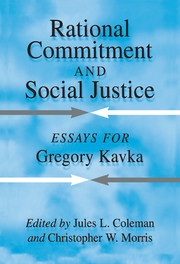Book contents
- Frontmatter
- Contents
- Acknowledgments
- List of Contributors
- Introduction: The Moral and Political Philosophy of Gregory Kavka
- Some Personal Memories
- The Shadow of the Future
- A New Paradox of Deterrence
- Rethinking the Toxin Puzzle
- Toxin, Temptation, and the Stability of Intention
- The Toxin Puzzle
- Religion and Morality in Hobbes
- Contemporary Uses of Hobbes's Political Philosophy
- The Knavish Humean
- Some Considerations in Favor of Contractualism
- Justice, Reasons, and Moral Standing
- Wrongful Life: Paradoxes in the Morality of Causing People to Exist
- Gregory S. Kavka's Writings
Religion and Morality in Hobbes
Published online by Cambridge University Press: 28 October 2009
- Frontmatter
- Contents
- Acknowledgments
- List of Contributors
- Introduction: The Moral and Political Philosophy of Gregory Kavka
- Some Personal Memories
- The Shadow of the Future
- A New Paradox of Deterrence
- Rethinking the Toxin Puzzle
- Toxin, Temptation, and the Stability of Intention
- The Toxin Puzzle
- Religion and Morality in Hobbes
- Contemporary Uses of Hobbes's Political Philosophy
- The Knavish Humean
- Some Considerations in Favor of Contractualism
- Justice, Reasons, and Moral Standing
- Wrongful Life: Paradoxes in the Morality of Causing People to Exist
- Gregory S. Kavka's Writings
Summary
Prelude on Religion and Morality
In “Religion and the Queerness of Morality,” George Mavrodes has argued that a religious view of the world is a necessary presupposition of morality, that morality makes sense only on a religious view. “Religion” here means at least a generic theism, incorporating doctrines common to Judaism, Christianity, and Islam. Specifically, unless you believe that you have been created by a God who will judge your actions in this life and mete out punishments and rewards in an afterlife, you will not find it rational to recognize and honor moral obligations. Moral obligations frequently require us to forego certain this-worldly goods. Telling the truth is (in most circumstances at least) a moral obligation, but often it carries a cost which seems to make it imprudent. Why should we pay that cost unless there is a system of divine justice, involving otherworldly goods, which can make up for the deficiencies of human justice? Mavrodes' position is a counterfactual version of that taken by Hobbes' Fool, who says in his heart that there is no God, and that, since there is no God, we have no reason to be just. Mavrodes says that if the Fool were right about there not being a God, he would also be right about the reasonableness of morality.
- Type
- Chapter
- Information
- Rational Commitment and Social JusticeEssays for Gregory Kavka, pp. 90 - 121Publisher: Cambridge University PressPrint publication year: 1998
- 2
- Cited by



